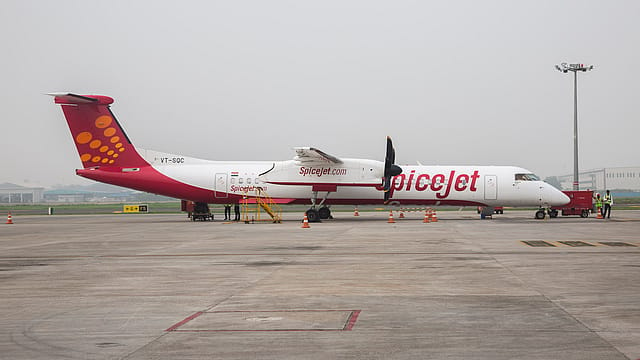SpiceJet stock tanks 5% as board considers raising fresh capital
ADVERTISEMENT

Low-cost carrier SpiceJet on Tuesday said its board of directors will consider options of raising fresh capital through the issue of securities to qualified institutional buyers.
"The Board of Directors of the Company in its meeting scheduled to be held on February 24, 2023 (Friday), will discuss and consider, inter-alia, issuance of equity shares on preferential basis consequent upon conversion of outstanding liabilities into equity shares of the Company, subject to applicable regulatory approvals," the Ajay Singh-led airline said in a stock exchange filing.
Reacting to the development, shares of SpiceJet plunged as much as 4.8% to ₹36.50 apiece on the National Stock Exchange (NSE).
SpiceJet's market share in the domestic sector fell to 7.3% in January 2023, lower than GoFirst (8.4%), Vistara (8.8%), Air India (9.2%) and Air Asia (7.4%). The cash-strapped carrier, however, retains the highest passenger load factor, the percentage of available seating capacity that has been filled with flyers.
The fundraising plan comes at a time when new entrant Akasa Air has intensified competition with cheap airfares. Earlier this month, Tata Group-owned Air India placed the biggest aircraft order ever from U.S.-based Boeing and French aerospace giant Airbus. The rival airline plans to buy 540 aircraft to modernise fleet and expand its network.
India's aviation regulator, the Directorate General of Civil Aviation (DGCA), had last year introduced curbs on SpiceJet, restricting the number of departures to 50% of the number of departures approved under summer schedule 2022 owing to repeated "safety incidents".
On numerous occasions, SpiceJet aircraft either turned back to its originating station or continued landing to the destination with degraded safety margins, the DGCA said, adding that the airline failed to establish a safe, efficient, and reliable air transport service under the aircraft rules.
The aviation watchdog kept the budget carrier under "enhanced surveillance" till October 29, 2022.
High aviation turbine fuel (ATF) prices have also hit the airline hard. Jet fuel constitutes around 40% of the running cost of an airline. "The high ATF prices and depreciating rupee continue to be a downer for the industry," Ajay Singh, chairman and managing director of SpiceJet, said in November last year.
The airline reported a net loss of ₹837.8 crore for the second quarter as compared to a net loss of ₹561.7 crore in the corresponding quarter last year. Total revenue in Q2 stood at ₹2,104.7 crore as against ₹1,538.7 crore in the same quarter of the previous year.